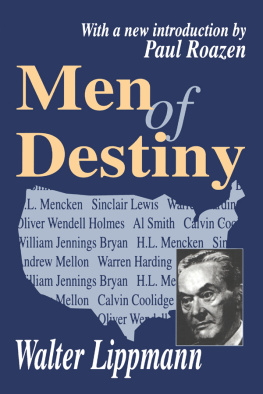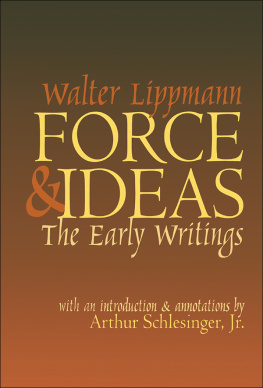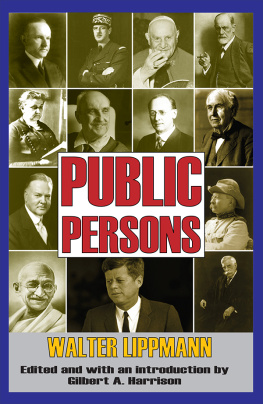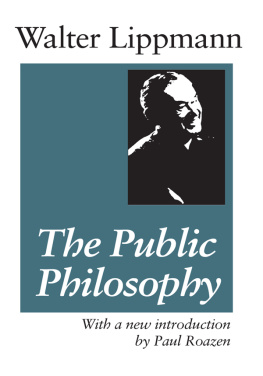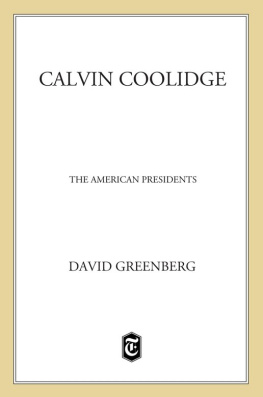Originally published in 1927 by The Macmillan Company, New York.
Published 2003 by Transaction Publishers
Published 2017 by Routledge
2 Park Square, Milton Park, Abingdon, Oxon OX14 4RN
52 Vanderbilt Avenue, New York, NY 10017
Routledge is an imprint of the Taylor and Francis Group, an informa business
New material this edition copyright 2003 by Taylor & Francis.
All rights reserved. No part of this book may be reprinted or reprodu ed or utilised in any form or by any electronic, mechanical, or other means, now known or hereafter invented, including photocopying and recording, or in any information storage or retrieval system, without permission in writing from the publishers.
Notice:
Product or corporate names may be trademarks or registered trademarks, and are used only for identification and explanation without intent to infringe.
Library of Congress Catalog Number: 2003042637
Library of Congress Cataloging-in-Publication Data
Lippmann, Walter, 1889-1974.
Men of destiny / Walter Lippmann ; with a new introduction by Paul Roazen.
p.cm.
Originally published: New York: Macmillian, 1927.
Includes bibliographical references (p.).
ISBN 0-7658-0514-6 (acid-free paper)
1. United StatesHistory1919-1933-Biography. 2. Politicians United StatesBiography. 3. United StatesPolitics and government 1919-1933. I. Title.
E747. L76 2003
920.0730904dc21
2003042637
ISBN 13: 978-0-7658-0514-0 (pbk)
W alter Lippmanns reputation is now in the process of being rehabilitated. Following Lippmanns death in 1974, his authorized biographer, Ronald Steel, composed a lengthy book1 whose initial appearance in 1980 provided, perhaps unintentionally, abundant ammunition for devaluing Lippmanns achievements. Not only did Steels Lippmann come across as a draft dodger in World War I, but as someone intensely ambivalent about his Jewishness and also capable of wooing away the wife of his best friend. Most damaging of all, in my opinion, was the biographers neglect of an adequate assessment of the seriousness of Lippmanns many books. While Steels concluding his volume by focusing on Lippmanns opposition to the Vietnam War might seem to some a way of rescuing Lippmanns moral standing, I think it only helped underscore Lippmanns status as a journalist rather than a serious political thinker. Attention to his books should be the real justification for a detailed account of his life. Even though Lippmanns columns became syndicated around the world, he had always insisted that his books were every bit as significant as his occasional pieces, and he considered it impossible to separate one line of endeavor from the other.
Men of Destiny, which originally appeared in 1927 and was almost immediately reprinted a couple of times that year, helps bridge the gap between the two most characteristic kinds of Lippmanns writings. Some of these pieces had originally appeared in the old Vanity Fair, although Steel somehow ignored Lippmanns note in Men of Destiny also acknowledging permission to reprint from the Atlantic Monthly, Foreign Affairs, Harpers Magazine, the New Republic, the Saturday Review ofLiterature, Yale Review, as well as Vanity Fair Steel correctly described some of the essential qualities of Lippmanns spirit in Men of Destiny, even if it was hardly all attributable to the forum of Vanity Fair:
Rather than diluting his style, the magazine brought out a side of his character - irony, a gift for character analysis, intellectual playfulness, and even a romantic idealism - that had been dampened at the ponderous New Republic. He did some of his freest and most engaging writing for Vanity Fair, and in 1927 put together a selection of his favorite pieces, mostly portraits, in Men of Destiny. Among the least known of Lippmanns books, it contains some of his sharpest insights and offers a revealing glimpse of the social conflict and political turmoil of the misnamed Jazz Age. In these articles Lippmann enjoyed himself, and in them one can see his gift for making abstract ideas alive and for pulling readers into subjects that might normally make them yawn.
Steel reports that in reaction to Men Of Destiny, Justice Oliver Wendell Holmes, Jr. wrote a friend (who turns out to have been the British political theorist Harold Laski) that Lippmanns writing is flypaper to me; if I touch it, I am stuck till I finish it.2 But a double-check of the actual Holmes Laski correspondence reveals that it was another book of Lippmanns that Holmes was writing Laski about in 1928:
I have read almost nothing - W. Lippmanns little book of course - American Inquisitors. His writing is fly paper to me - if I touch it I am stuck till I finish it. He writes so well - and sees so much that it is difficult to put into words - I think he talks as wisely as possible about our fundamentalism and modernism.3
Despite Steels not uncharacteristic slip about which Lippmann book Holmes was referring to, it has to be noteworthy that people like Holmes and Laski had both been for years keeping up with all of Lippmanns writings. Lippmann chose to conclude Men of Destiny with a 1916 piece of his written as a tribute to Justice Holmes on his seventy-fifth birthday. In contrast to how Lippmann thought the countrys business at Washington got conducted in an odor of dead and dying cigars suspended in steam heat, the house Justice Holmes occupied stood out for Lippmann in contrast to the pervasive thick, tepid, tired air... in which visions die. For in Holmes Lippmann found that wisdom has lost its austerity and becomes a tumbling succession of imagery and laughter and outrage. Steels mixing up Men of Destiny with American Inquisitors may be small potatoes compared to the general anti- historical tendency of our time, in which a contemporary professor of law writing on Holmes can ignore the merits of the memorable tribute Lippmann had once paid Holmes:
At seventy five, a justice of the Supreme Court and a scholar known wherever the common law is studied, his heart is with the laughing sad men, who have mixed bitterness and beauty, and staked their souls on a gamble with life. He fought in the Civil War and was wounded; he has looked at death lightly, and known what it is to live dangerously. A sage with the bearing of a cavalier, his presence is an incitement to high risks for the sake of the enterprise and its memories. He wears wisdom like a gorgeous plume, and likes to stick the sanctities between the ribs.
He has lost nothing that young men have, and he has gained what a fine palate can take from the world. If it is true that one generation after another has depended upon its young to equip it with gayety and enthusiasm, it is no less true that each generation of the young depends upon those who have lived to illustrate what can be done with experience. They need to know that not all life withers in bad air. That is why young men feel themselves very close to Justice Holmes. He never fails to tell them what they want to hear, or to show them what they would wish men to be.4
Instead of appreciating what Holmes could mean to youngsters like Lippmann in 1916, it is possible for a legal scholar recently to denounce Holmes in the course of penning an anachronistic chapter tellingly asking the rhetorical question: Would You Have Wanted Justice Holmes as a Friend?5

